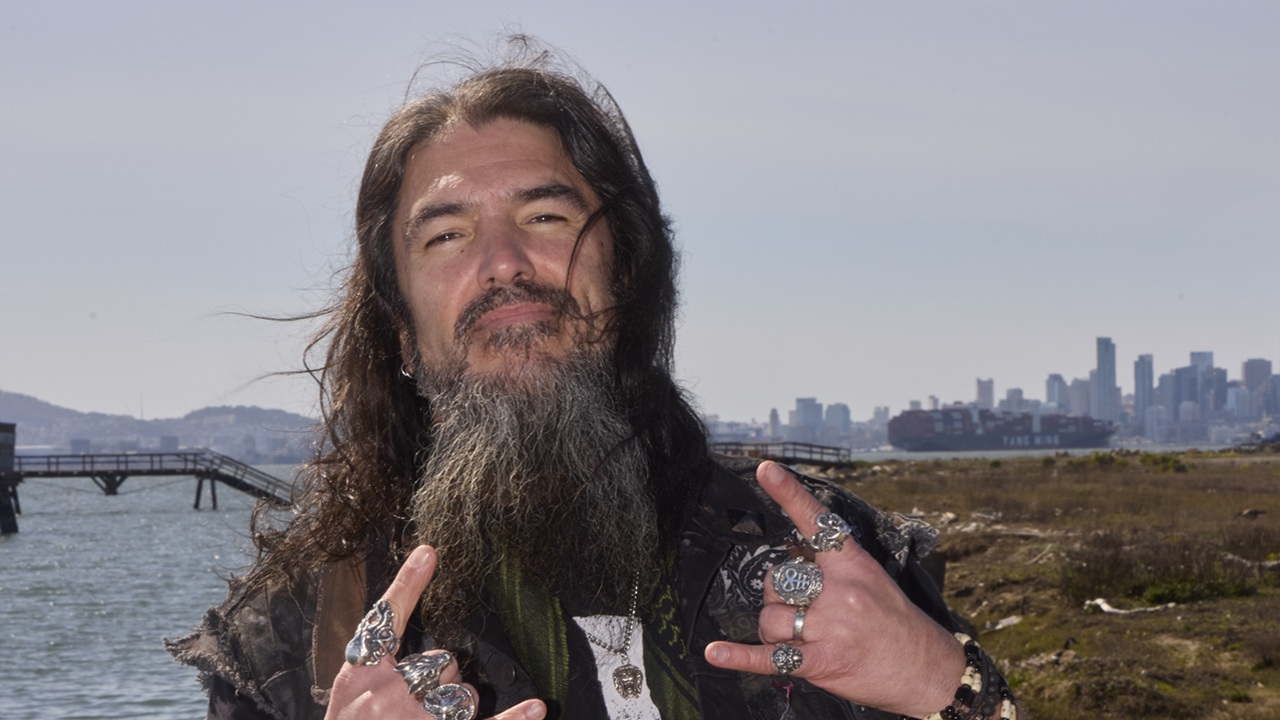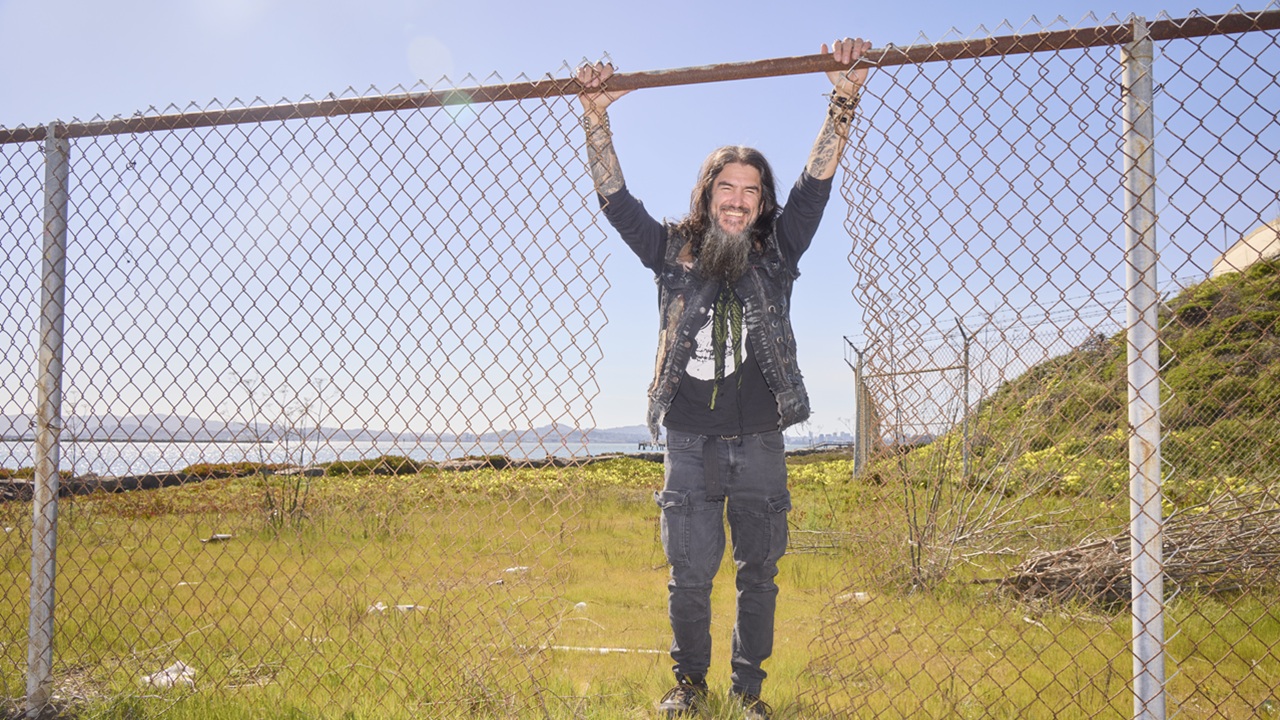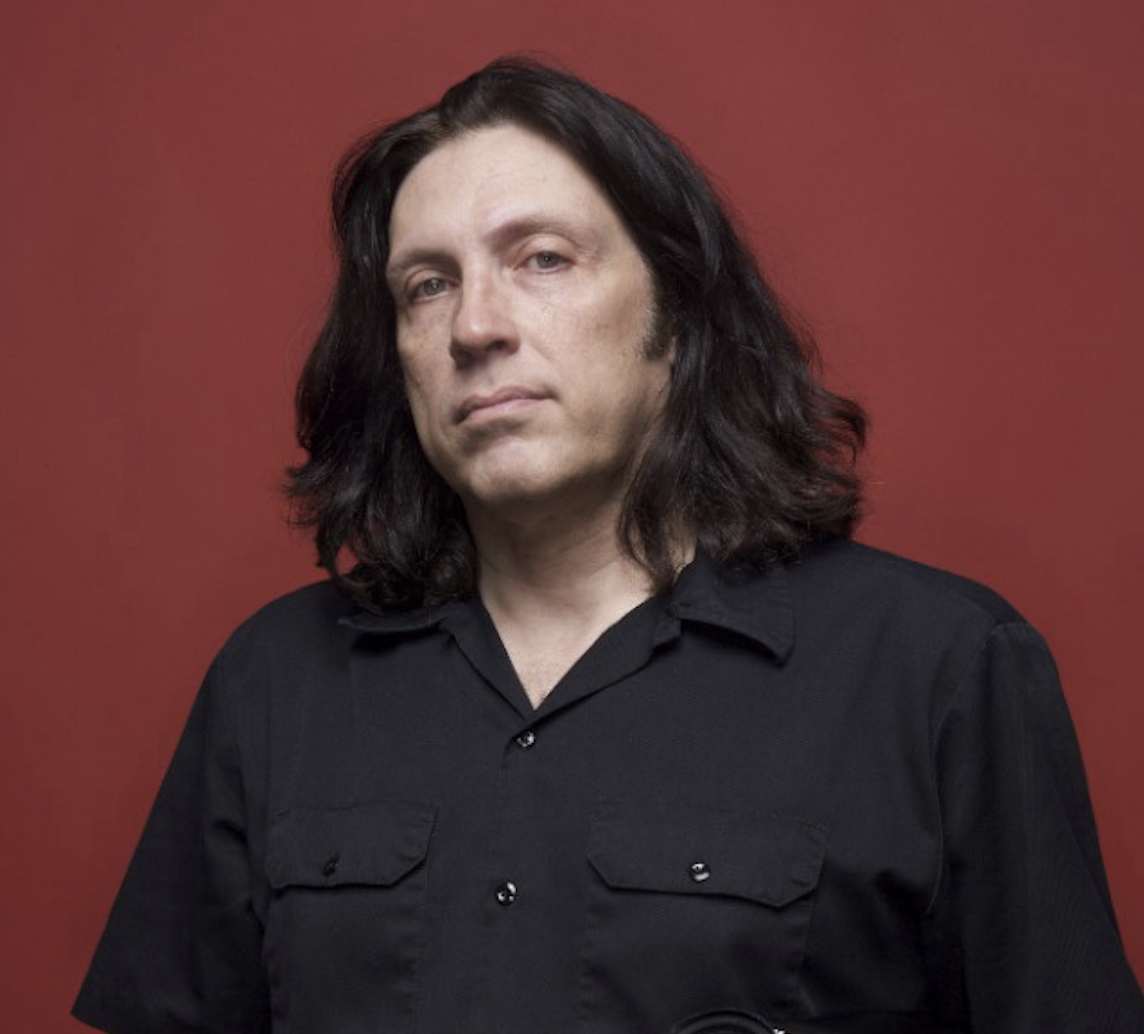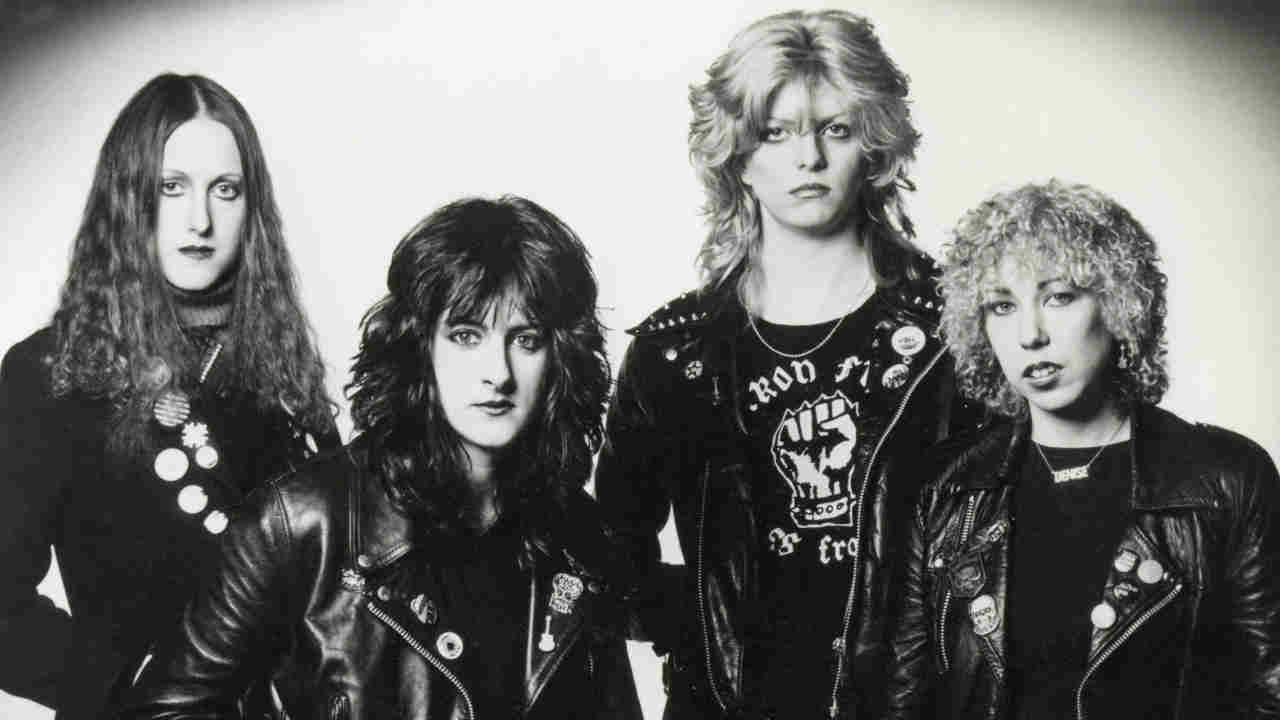"There would be shootouts down the street." Machine Head's Robb Flynn takes us on a tour of Oakland, California - and 30 years of metal history
From broken ribs and drug deals to playing arenas and stadiums around the world, Robb Flynn has proved time and again he's metal's ultimate survivor

Just across the bridge from Oakland, California, Robb Flynn from Machine Head is climbing through a hole cut into a chain-link fence. He’s at the sprawling former Naval Air Station in Alameda, decommissioned nearly 30 years ago, and he scrambles onto the rock embankment that separates the ocean from a disused airfield and a marsh. He’s also moving fast, a heavy metal lifer in black marching toward the San Francisco skyline on the horizon, with hardly a look back.
The longstanding leader, singer and guitarist of Machine Head is also trespassing today. The discarded military base is largely open to public exploration, with miles of buildings boarded up and abandoned to graffiti and broken windows. It also happens to be prime waterfront real estate, and several airplane hangars have been revitalised as breweries and wineries, where Robb will be soon enough.
But for the moment, he’s taking a stroll far past a fence meant to keep civilians out. Metal Hammer is along for the ride on this impromptu tour of the Bay Area, the beloved once and forever home to the veteran musician. And several minutes later, a private security car rolls up to the hole in the metal perimeter and waves us back.
After returning to the fence, Robb walks over to the black security SUV and looks inside with a thumbs up. “Are we good?” The female guard doesn’t seem especially concerned, but says of the marsh, “If you fall, we’re not going to find you.”
Hours earlier, we’re in the private studio he calls Robb’s Jam Room, a spot he’s had for the last seven years, created in the old meat packing district adjacent to Jack London Square. Dressed in layers of black denim, his black beard full and streaked with grey, Robb lifts up the baritone Flying V guitar in his hands, chipped and scratched from 15 years of recording and road work, and says proudly, “This is my main Flying V. It’s just beat to shit and been fricking dropped a hundred times and had beer and vodka poured all over it.”
Nailed to the blood-red wall behind him are banners commemorating 30 years of the band’s history, from Burn My Eyes to The Blackening to Of Kingdom And Crown. Down the hall is Shark Bite Studios, where Machine Head recorded some of those records along with parts of the new album, Unatoned.
Produced by Robb and Zack Ohren, it was recorded between July 2023 and December 2024, and played by the returning line-up of bassist Jared MacEachern and drummer Matt Alston, and is the first to feature the band’s newest member, former Havok guitarist Reece Scruggs.
“He’s done, like, 200 shows with us, so it doesn’t feel new,” Robb says. “He brought some killer riffs.”
Above the front door is a painting of Dimebag Darrell, a onetime drinking buddy and touring partner, depicted raising his guitar and accompanied by text recreating the Pantera song-title, Strength Beyond Strength. He smiles and says, “We toured for three and a half months together. I had a lot of whiskey with Dimebag.”
The studio gets more use now than ever, with a livestreaming show performed weekly (when Machine Head aren’t on tour) direct from Robb’s Jam Room. His Electric Happy Hour started during the pandemic, as a way for Robb to keep connected to fans during a time of crisis and an especially dark and uncertain period for the music world, transmitting metal and good cheer initially through his iPhone.
“I never thought I’d go down a route like this in my life,” he says, “but I was climbing the walls during the pandemic.”
More significant to him personally is that the studio is here in Oakland. This is the city of his birth, and he’s bounced around the Bay Area ever since, spending his first years growing up in San Lorenzo.
“It keeps you humble, that’s for sure, ’cause it’s still a pretty rough-and-tumble town,” he explains. “People think like, ‘Oh, it’s California.’ I’m like, ‘Yeah, but it’s Oakland.’”
To demonstrate, Robb leads Metal Hammer into his SUV to begin the tour of his hometown, to point out some of the Oakland spots that mean something to him, past and present. First we pass a boarded-up music venue called The Metro, the site of many birthday celebration shows.
“It was painted all black on the inside, and stayed open until dawn serving alcohol after hours,” Robb says with a grin from behind the wheel. “Very sad when it went away. It was such a good vibe.”
Then there’s the Merchant’s Saloon, with hand-painted anchors and stars by the door. In the window is a sticker reading ‘Fuck Off’ and another with a ‘No Nazis’ symbol.
“This is probably the best bar in all of Oakland,” Robb nods knowingly. “It’s been here since 1916. It’s a legit dive bar. It’s got a latrine that goes around the bar, so people could pee at the bar and it would drain out into the street. That’s how OG it is. Jared and I go there quite a bit.”
Born in Oakland in 1967, Robb grew up on these streets and all over the Bay Area, a region known for decades of vibrant music scenes, including an early explosion of thrash. It was a metal revolution defined by Exodus, Testament and, ultimately, a young band of expats from LA called Metallica.
After growing up with the sounds of Van Halen and AC/DC in his ears, Robb’s discovery of thrash was a revelation: “I was crazy about it instantly.”
It was a life-altering time he pays tribute to on the new album’s first song, Atomic Revelations, with a sound that he calls a “love letter” to his hometown with a speedy blast of “pure Bay Area thrash metal”, and lyrics obsessed with the open-ended danger to future generations from nuclear waste.
He quickly had real dreams of making his own noise onstage, but he was a committed fan as well, a euphoric teenage commando of the circle-pit and stagedives, regularly coming home with injuries. One night at an early Slayer show, he was up front as usual, and the packed crowd began to fall over, leaning hard to the left, when another dude’s elbow pressed against his ribs. “In slow motion, my rib goes pop!” he remembers. “Oh my God, I was in so much fucking pain.”
But he wasn’t about to leave. He was already hammered, and when Slayer came on, he raged for the next 45 minutes. Then he paid for it with a month of painful healing of his broken bone.
The journey from fan to creator didn’t take long. In 1985, while in high school, he co-founded a thrash band called Inquisitor, soon to be renamed Forbidden Evil (and later shortened to Forbidden after Robb’s exit in 1987). Then there was Vio-lence, with future Machine Head guitarist Phil Demmel.
Robb began Machine Head while living in Fremont, which was 60 miles away from the clubs in San Francisco and Oakland, so the locals threw keg parties in backyards and living rooms. The main difference from a full-on thrash show in the city was that many in the crowd were older, and craving covers of classic hard rock.
“We’re out there playing Black Magic by Slayer and A Lesson In Violence by Exodus and Whiplash by Metallica, and they don’t know any of these songs because this is underground music,” Robb remembers. “They’re like, ‘Hey, man, play some Zeppelin!’ So they might want to kick your ass because you’re not playing Black Sabbath. And then you go to the thrash clubs, and if you weren’t fast enough or heavy enough, they’d kick your ass for not being thrash.”
Even so, at the keggers, Machine Head mixed the covers with thrash originals, and got some local momentum, moving up to church halls and community centres. Then the band finally made it to Ruthie’s Inn, the notorious thrash nightclub in Berkeley.
It was their first legitimate club gig, as one of four bands opening for Metal Church. Robb was just 18 and the band were hardly paid anything. It didn’t matter. “About three songs in, a circle-pit broke out,” Robb says, recalling their very first performance there. “I was like, ‘OK, we did it.’ We knew that we were heavy enough and fast enough. It was like the stamp of approval. It was a big moment for us.”
By the early 90s, the young rock fanatic was also working in catering backstage for legendary concert promoter Bill Graham Presents, giving him a front row seat to the music business.
“Scott Weiland from Stone Temple Pilots came up, and I gave him a plate of enchiladas and a Machine Head demo,” Robb recalls. “He was super-annoyed, which I totally get now. I was just hustling and grinding but it was good. I dealt drugs for a while.”
He now figures he attended about 100 shows a year of all kinds. He saw Soundgarden on Louder Than Love, Alice In Chains play to just a few dozen people on their first album, Nirvana in the early days of Nevermind. He remembers witnessing locals Green Day play to 500 people in the nightclub Berkeley Square before Dookie was released, plus multiple shows by Metallica, Motörhead and many other “really killer, amazing moments”.
By then, the Bay Area thrash scene was on its way out. Grunge was coming in, and so was the hard funk of Primus, Faith No More and the Red Hot Chili Peppers. “The bottom of everything drops out at some point. It was killer for a good seven years. It was insane. And then a new style came along,” he says.
Even Metallica had evolved with The Black Album, and as a fan and fellow artist, Robb fully approved. “They were this band from the Bay Area that had this incredible phenomenon of an album, and then it changed into something cool,” he smiles. “It wasn’t thrash anymore. It was just something else.”

We’re driving past a huge homeless encampment on the streets of East Oakland. It’s an entire village built from scraps of wood, metal and cardboard on a narrow traffic island between opposing lanes of traffic.
“It’s fucking intense,” Robb says. “It’s been like this for so fucking long, I don’t remember when it wasn’t like this.”
Minutes later, Robb parks the SUV, strolls down a sidewalk and stops next to an old Victorian two-storey building. The aged wooden exterior is painted green. This was an early home to Machine Head, where a friend had a marijuana-growing business upstairs and a spot for band rehearsals downstairs.
“We jammed there for a while,” he says, noting that it’s where they wrote songs for Machine Head’s 1994 debut album, Burn My Eyes, including standout cut Davidian. Their A&R guy, Monte Conner, formerly of Roadrunner Records, and now with Nuclear Blast, came out to see them here and was sold on what he heard.
“This area used to be all controlled by gangs. There would be, like, shootouts down the street, and we’d have to run back in and hide for an hour or two and let everything calm down,” Robb says. “It added to the vibe of the record.”
In the mid-90s, Robb cut a very different figure, with hair braided tightly, beard twisted into points, at times in khakis and a black windbreaker, guitarist Logan Mader bouncing high off the stage behind him. This was a metal band already comfortable with hip hop, as their faithful take on Ice-T’s gangsta landmark Colors soon proved.
In the video for Davidian, Robb and the others are shown walking down San Francisco’s streets with a leashed pitbull leading the way. It marked the arrival of Machine Head and their modern blend of metal, with roots in thrash, but with layers of groove metal and more. The music wasn’t only dependably hard, but creatively ambitious, potential that would fully show itself a decade later on career peaks such as The Blackening and Unto The Locust.
In 1999, some followers heard the band veering away from groove metal and into a controversial nu metal sidetrip with The Burning Red, but others heard a searing and merciless self-examination by Robb of his own dark places, a personal story that dealt with harrowing sexual abuse in his youth, cutting his own skin, and later on included an especially intense period of self-destruction (alcohol, ketamine) that immediately preceded the recording.
Robb has been a family man for years now. His eldest son, Zander, is 20, and the youngest, Wyatt, is 18 and about to graduate high school. Neither are musicians, though Zander was credited with being part of a children’s choir back in 2011 on Unto The Locust. But they have embraced other aspects of the life.
When Robb brought them out last year to Hellfest in Clisson, France, where Machine Head were the Friday night headliners, his boys were right up front crowdsurfing. “It was such a moment to watch my youngest coming over the rail, just raging,” the singer recalls with a grin.
The new Machine Head album follows 2022’s Of Kingdom And Crown, a critical and popular success that hit No.1 on the UK Rock & Metal Albums Chart, and marked a real comeback following the disappointing response to 2018’s nu metal-ish Catharsis. (After that album, longtime drummer Dave McClain and guitarist Phil Demmel quit.)
Of Kingdom… was also the band’s first concept album, set in a post-apocalyptic wasteland as two antiheroes face personal tragedy and hunger for revenge. Robb knew another concept album wasn’t likely to follow.
“I’d been trying for years to do it and I finally got lightning in a bottle,” he says of his feelings of accomplishment after Of Kingdom…. “I’m like, ‘Don’t tempt the gods. You can’t do it two times in a row.’”
Even so, he sensed a theme emerging in some lyrics on what became Unatoned, after witnessing a number of divorces among some of his longtime friends, a trend he found deeply upsetting.
“The pandemic kind of split people apart, and a bunch of people ended up breaking up after really long relationships,” Robb says. “It was very jarring and it was very hard. People want you to take sides and it sucked, because these are longtime friends – decades-long friends.”
One of the songs that came out is the agonised Bonescraper, with crushing guitars, beats and soaring choruses amid the vocal rage, as Robb vents words of frustration and heartbreak: ‘Love is just a loaded gun / Compromise will get you nowhere / Arguments, and pointless warfare / The price of love is the price of heartache / Your tongue a knife pointing every mistake.’
At one point, he shared the album in progress with his good friend Mike Schleibaum, guitarist from Washington, DC melodic death metallers Darkest Hour. “He’s one of the best dudes ever. And when I played it for him, he was like, ‘What the fuck, Robb? You are so pissed! You literally sound like it’s you against the fucking world. You sound like a band on their first record.’”
Machine Head also stretch out in other new ways on Unatoned, including on Not Long For This World, the first Machine Head track to feature all clean vocals amid the slicing riffs. But the biggest leap comes on album closer Scorn, a dramatic ballad with soaring musical and emotional flourishes. He had the help of Jordan Fish, former keyboardist and producer of Bring Me the Horizon, and a regular Flynn collaborator since 2014’s Bloodstone & Diamonds, plus co-producer Zack Ohren, to make it happen. Another frequent collaborator, Joel Wanasek, helped Robb translate to piano song ideas originally sketched out on guitar.
“For the last 15 years now, I’ve wanted to write a Coldplay/ Elton John-style piano ballad, because I’m a total sucker for the Coldplay/Elton John piano ballad,” Robb explains. “And I’ve failed for 15 years. It always turned out super-corny and super-stupid and ridiculous.”
What finally changed was a bit of inspiration that struck during a 3am writing session, as he reflected on the election year unfolding around him in 2024.
“I was writing about how I don’t believe in Trump, but I think the Democrats are a bunch of spineless pussies, and I feel lost in the middle somewhere.”
Machine Head have always been outspoken, challenging listeners with messages on lingering racism in the US and other societal failures, but they have never been an overtly political band, much less a partisan one.
“We’re a band from Oakland. We’re a band from the streets. We’ve sung about the streets, and I tried to avoid taking a political stance one side or the other,” Robb says, before going on to refer to the shanty town we drove past. “East Oakland’s been the same, and it don’t matter who is the fucking president. The ghetto’s been the ghetto and it ain’t changed.”
Our final stop is Almanac Beer Co., a brewery and tap room built inside a 30,000 square foot former naval hangar in Alameda, with an elegant redwood bar and outdoor beer garden, and room enough for several hundred drinkers. Robb orders a rousing and perfectly timed coffee stout and sits outside.
It’s about 4pm, so the place is mostly empty ahead of the after-work rush hour. As Robb sips his drink and snacks on spicy chicken tenders, the PA overhead plays Seals & Croft’s gentle 70s hit Summer Breeze. Following an especially successful album can be a daunting task, and Robb has been in this situation before, most famously after 2007 tour de force The Blackening.
Metal Hammer named it ‘album of the decade’, and it’s often likened to Metallica’s Master Of Puppets. With that, Machine Head’s metal legacy was secure – but how could anything follow The Blackening and not be overshadowed?
“Look, I’d rather be the guy who wrote The Blackening than the guy who didn’t!” Robb says with a laugh. “But to some degree, it’s a gift and a curse, because you gotta follow up that record. And all anybody does is compare it to that record – that is not an unfair thing to do, it’s just what people do. I learned that you gotta go someplace else. And maybe at first it doesn’t stand apart, but I’m really confident that this record will stand apart and be its own album in the Machine Head catalogue.”
Under his leadership, that attitude has kept Machine Head an essential player through the inevitable ups and downs in sales and chart action, changing tastes, and the abrupt rotation of band members. It’s earned his band an organic following built on respect and loyalty, not passing trends or the sheer cultural domination of thrash heroes like Metallica and Slayer. Machine Head have thrived by willingly stepping into unexpected territory – and through the occasional chain-link fence.
“One of the hardest things to do in a band is to find your own lane, and to stick at it,” Robb concludes over his glass of black stout. “All of my favourite bands were heavily evolving bands – The Beatles, The Cure, even Slayer on those first five albums. Metallica, too. Nothing wrong with playing it safe. But for me, I gotta go someplace else.”
Unatoned is out now via Nuclear Blast. Machine Head headline Rockstadt, Wacken and Bloodstock festivals in August.

Steve Appleford is a Los Angeles music journalist who has also written for Rolling Stone, Revolver and the Los Angeles Times. Over the years he's interviewed major artists across multiple genres - including Black Sabbath, Slayer, Queens of the Stone Age, System of a Down, KISS, Lemmy, the Who, Neil Young, Beastie Boys, Beyonce, Tom Jones, and a couple of Beatles.


